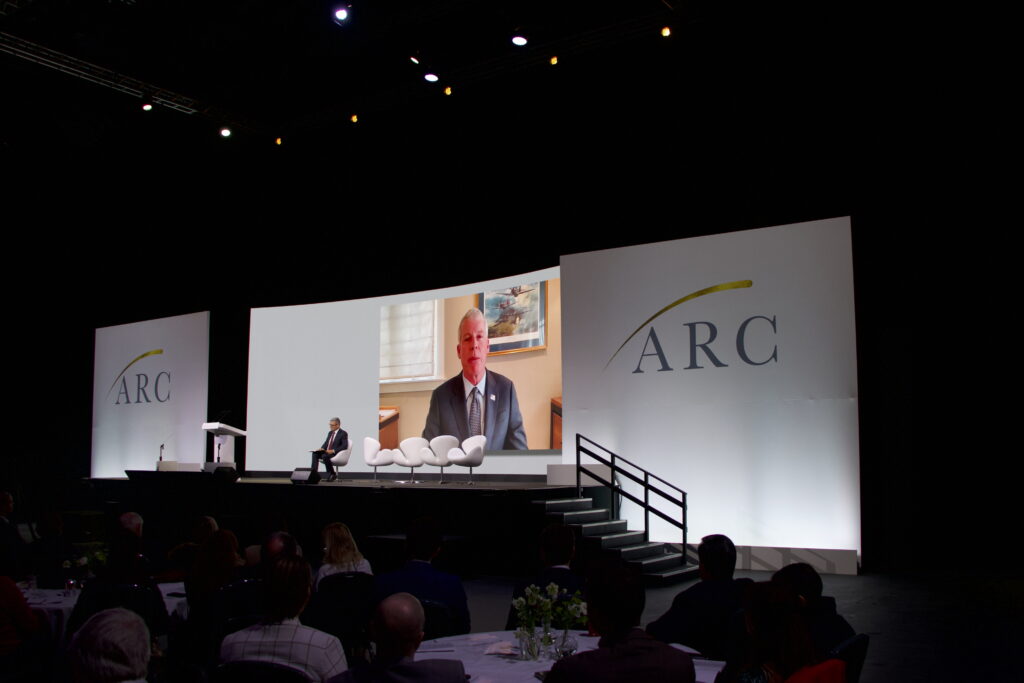The ever-wise Yogi Berra once quipped “It’s like déjà vu all over again,” a truism applicable to a recent huge decision handed down by the United States District Court for the District of Columbia.
A story covered only by McClatchy News‘ Michael Doyle, Judge Ketanji Brown Jackson shot down Sierra Club and National Wildlife Federation’s (NWF) request for an immediate injunction in constructing Enbridge’s Flanagan South tar sands pipeline in a 60-page ruling.
That 600-mile long, 600,000 barrels per day proposed line runs from Flanagan, Illinois – located in the north central part of the state – down to Cushing, Oklahoma, dubbed the “pipeline crossroads of the world.” The proposed 694-mile, 700,000 barrels per day proposed Transcanada Keystone XL northern half also runs to Cushing from Alberta, Canada and requires U.S. State Department approval, along with President Barack Obama’s approval.
Because Flanagan South is not a border-crossing line, it doesn’t require the State Department or Obama’s approval. If Keystone XL‘s northern half’s permit is denied, Flanagan South – along with Enbridge’s proposal to expand its Alberta Clipper pipeline, approved by Obama’s State Department during Congress’ recess in August 2009 – would make up that half of the pipeline’s capacity and then some.
At issue in the District Court was the legality of the U.S. Army Corps of Engineers issuing a Nationwide Permit 12 to shove through the Flanagan South (much like the Appeals Court case covered here on DeSmogBlog just weeks ago with Transcanada’s Keystone XL‘s southern half, rebranded the “Gulf Coast Pipeline Project” by Transcanada).
Sierra Club and NWF argued for an injunction – or halt – in constructing and pumping tar sands through Flanagan South until the legality of issuing a Nationwide Permit 12 is decided, an issue still awaiting the decision of Judge Jackson. Like the Keystone XL southern half case, Nationwide Permit 12 was used instead of going through the National Environmental Policy Act (NEPA).
NEPA – unlike the fast-track Nationwide Permit 12 – requires the EPA to issue a full draft Environmental Impact Statement and final Environmental Impact Statement, with 1-2 month public commenting periods following each Statement. EPA must take public comments into account when making its final judgments on pipeline projects.
Use of Nationwide Permit 12 has quickly become a “new normal” for fast-track approval of tar sands pipelines and other controversial domestic energy infrastructure projects.
Corporate Profits vs. Environmental Harms
Judge Jackson – an Obama appointee with a legal background predominantly in corporate law – boiled down the competing parties’ arguments into a “harms” balancing test: Enbridge’s corporate profits vs. irreparable environmental and ecological harms Enbridge’s Flanagan South may cause.

Judge Ketanji Brown Jackson; Photo Credit: United States Sentencing Commission
She wasted little time getting to the point, issuing her judgment denying Sierra Club’s and NWF‘s injunction request by the second paragraph on the second page of the ruling. She then spent the next 58 pages giving in-depth legal justifications as to why.
“Plaintiffs have significantly overstated the breadth of federal involvement in the pipeline project and have failed to establish sufficiently that applicable federal statutes and regulations would require the extensive environmental review process that Plaintiffs seek,” Jackson wrote. “Moreover, Plaintiffs have fallen short of demonstrating that irreparable harm will result if the current construction proceeds during the pendency of this litigation, and the Court is not convinced that the balance of harms and public interest factors weigh in Plaintiffs’ favor.”
Flanagan Shrouded in Secrecy
One of the major grievances of Sierra Club and NWF had – like Sierra Club had with the Army Corps of Engineers permitting for Keystone XL‘s southern half – is that Nationwide Permit 12 generally deals with small projects deemed “single and complete,” usually half an acre in size or less.
“When constructed, the FS Pipeline will cross approximately 1,950 wetlands or waters under the jurisdiction of the Corps—an area that, as noted above, totals 13.68 miles,” Jackson explained in outlining the Plaintiffs’ argument.
Thus, Enbridge received close to 2,000 Nationwide Permit 12’s – all “single and complete projects” – despite the fact it is one single pipeline running from north central Illinois to Cushing, OK.
Sierra Club did a Freedom of Information Act request to learn more about the scope and environmental impacts of Flanagan South, only to see its requests denied by the Army Corps of Engineers, first initially and then again after its appeal. Even though Nationwide Permit 12 doesn’t include public hearings and there were no public hearings for Flanagan South, Jackson argued to the contrary.
“Notably, general permits—including the nationwide permit at issue here— undergo a stringent pre-approval evaluation process that involves a comprehensive environmental assessment under NEPA and also public notice and comment,” she wrote.
Yet it’s the very lack of a public commenting period and lack of a “comprehensive” environmental assessment that’s at the crux of this legal challenge by Sierra Club and NWF to begin with. From day one, Flanagan South has been shrouded in secrecy.
“This project hasn’t been on the public radar because it was permitted behind closed doors without any public notice or process,” explained Sierra Club attorney Doug Hayes in an interview with DeSmogBlog. “Even our repeated FOIA requests for information about the project’s impacts were denied.”
“Most people we’ve talked to along the route have been shocked to learn that a tar sands pipeline is being built in their backyards and there was no NEPA process at all. No agency held any public hearings nor allowed public comment.”
Jackson Admits Fast-Track Name of Game
Even Judge Jackson admitted the whole point of Nationwide Permit 12 is to fast-track construction of pipelines and other related projects, thus contradicting her earlier claims of the review for Flanagan South being “comprehensive.”
“The purpose of the statute that authorizes general permits such as the nationwide permit at issue here is to allow the Corps to designate certain construction projects…with little, if any, delay or paperwork,” Jackson wrote.
“In other words, the requisite comprehensive environmental review is done upfront under the general permitting system precisely to avoid a NEPA environmental review regarding certain projects that fit into categories of activity that have been predetermined to have minimal environmental impact. Therefore, once the Corps’s district engineers verified that the discharges resulting from the FS Pipeline satisfied NWP 12, no additional environmental review was required.”
Jackson: “No Ultimate Environmental Effect”
Jackson made it crystal clear how seriously she takes the potential ecological impacts of Flanagan South: not seriously at all. She went so far as to call the environmental worries of Sierra Club and NWF “bald allegations,” reducing plaintiffs’ environmental worries to fear of harm to “flora and fauna.”
“[N]otwithstanding Plaintiffs’ bald allegations of concrete injury to flora and fauna, the record does not clearly establish that the FS Pipeline construction will have a significant or substantial impact on the wildlife in the pipeline’s path,” opined Jackson.
“[T]he environmental impact of the pipeline construction may be minimal, and the Corps has already verified that the seemingly troublesome water crossings will have little or no ultimate environmental effect…It is also apparent that Plaintiffs have significantly overstated the certainty and imminence of some of the injuries they predict.”
Comparisons to other major tar sands pipeline spills – such as Enbridge’s “dilbit disaster” spill into Michigan’s Kalamazoo River, the recent ExxonMobil Mayflower, Arkansas spill and the 12 Transcanada original Keystone tar sands pipeline spills – all went unmentioned in Jackson’s ruling.
“The Court acknowledges and accepts that some of the people who live in areas near the pipeline project are sincerely worried about the harm that an oil spill might cause,” she wrote. “As genuine as these concerns may be, Plaintiffs have not shown that a damaging oil spill is likely to occur…In other words, the harms that an oil spill might potentially someday cause—however fearsome—are not certain…”
Judge Johnson’s argument flies in the face of the lived existence of one of Enbridge’s Steptoe & Johnson attorneys for the case, David Coburn. He also serves as legal counsel to Enbridge for its clean-up efforts in Michigan, the largest domestic tar sands spill in U.S. history.
Ruling: Corporate Profits Sacrosanct
After spending 55 pages trashing the Sierra Club/NWF legal arguments and dismissing potential environmental impacts of Flanagan South out-of-hand, Jackson then applies the corporate bottom line vs. environmental harms balancing test.
“In the Court’s view, Enbridge…[has] the better of these arguments,” wrote Jackson. “With respect to the balance of harms, the record as it currently stands shows that Enbridge has committed major resources to the FS Pipeline project over the last 18 months, including engaging in an intensive effort to comply with the myriad state and federal environmental regulations that the pipeline project implicates. The evidence of the time and effort that Enbridge has already put in to the project lends credence to Enbridge’s argument that it will suffer harm if the pipeline is indefinitely delayed.”
Jackson then scoffs at the environmental harms caused by the pipeline, not even once mentioning climate change.
“Plaintiffs, by contrast, have failed to demonstrate the harms that they allege with specificity in regard to the FS Pipeline in particular, relying instead on general harms they have identified by analogizing this project to other pipelines,” she wrote. “While the Court is aware of the potential negative environmental consequences that can accrue from the construction and operation of a large oil pipeline, it is also hesitant to weigh these possibilities too heavily without more evidence linking them to this particular pipeline project.”
What’s Next?
Sierra Club and NWF have both yet to decide if they will appeal this injunction ruling while they await a ruling on the legal merits of their Nationwide Permit 12 challenge. If they do appeal it, the U.S. Circuit Court of Appeals for the District of Columbia – often referred to as the “DC Circuit” – will hear the case.
“We are disappointed with the ruling,” remarked Hayes. “According to the government’s position, no oil pipeline would ever have to undergo an environmental analysis in the United States, no matter how dangerous the project or how many federal agencies are involved.”
Debra Michaud – an activist with Tar Sands Free Midwest, a grassroots group developing a campaign to fend off Flanagan South – says this decision will only further embolden area activists moving forward.
“We are outraged. This decision, with its nationwide implications, sets a dangerous precedent and legal justification to ram pipeline projects through without any regard for landowner rights and environmental regulations,” she said. “Activists in the Chicago area are calling for a nationwide campaign to fight this egregious abuse of power.”
Photo Credit: tankist276 | ShutterStock
Subscribe to our newsletter
Stay up to date with DeSmog news and alerts







